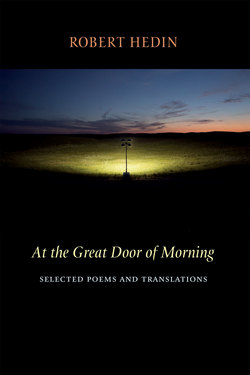Читать книгу At the Great Door of Morning - Robert Hedin - Страница 6
На сайте Литреса книга снята с продажи.
ОглавлениеForeword by Ted Kooser
A novelist friend once told me he thought The Great Gatsby was a perfect work in that it made not a single misstep. It seems to me that At the Great Door of Morning is another perfect work, each of its poems and translations expertly tuned and thoughtfully presented to its strongest, most moving effect.
I have been reading Robert Hedin’s fine poems and translations for many years, and I have yet to find anything faulty about any of them. (I might have said, “about the least of them,” though I would be hard put to find a “least” among them.) I’ve met Robert, and from what I’ve seen, everything about the life he leads seems to be in perfect order, appears to have been the very best choice of what to do. So it is no wonder that he would not let a single poem go out into the world until it was ready.
I am not talking about competency. There are thousands of competent poets in our country. This poet has moved beyond competency as though it had been a middle-school phase of his artistic development. His work has moved on into meaningfulness, into beauty, into art.
Dana Gioia was once asked by a young professor what his “project” as a poet was, and he replied, “My project is to break your heart.” And that’s what I’m looking for in reading a poem, to be that deeply moved. I want more than anecdote, more than cleverness, more than erudition. I want what Jim Harrison described as poems with “human heat.” And thanks to Robert Hedin and Copper Canyon Press, here they are, a whole book of them.
We live in a narcissistic society, quite possibly the most self-absorbed society ever, as evidenced by millions of daily Facebook postings. And surely others besides me have guiltily enjoyed reading in the news of someone taking a “selfie” at the Grand Canyon and falling back over the edge. Thus it is a great pleasure to read poems in which the “I” is either absent or is present as a clear-sighted, unsentimental witness. The speaker in these poems never shows us despair and self-pity; here are awe and wonder. Here’s Hedin, in the “Field Notes” section of this book: “A good poem breaks through the numbing, stultifying voice of our mass culture to successfully articulate, in all its breadth and meaning, a land-scape of conviction, a deeper circuitry that helps give life its necessary shape and substance.”
In addition to Hedin’s own poetry, three Norwegian poets are here translated to good effect. That is, the resulting works, in American English, are poems in their own right, and the identity of the translator is veiled or hidden. I am reminded of the opening of the popular BBC series Downton Abbey, where we see the hands of, one presumes, the butler, using a ruler as he checks to see whether the table setting has been done to his satisfaction. The art of translation is much like that, consisting as it does of carefully arranging words, like china, silver, and glassware on a table, while wearing gloves. Hedin has made the arrangement and has left few fingerprints.
In these pages you’ll find your own poems to love. I especially enjoy the tornado poems, which mirror the way in which weather anecdotes are delivered in everyday speech. I’ve studied the reminiscences of people who’ve survived weather disasters, and these poems by Hedin have that kind of authenticity. However, the poems I return to again and again are those in which Hedin is out walking the world and telling us what he is seeing, such as those poems set in Europe. He is for me the perfect guide, his job to direct our attention to things we should notice. If an “I” appears, it is only in the service of authenticity.
Fifteen thousand years ago, when the human family was living at the mouths of caves, one of us would venture deep into the forest looking for something to eat and would then come back to tell the rest what he or she came upon out there. It was the account of that experience that most mattered to us, not the teller who had survived it. We wanted a good telling, and still do. Here is Robert Hedin at the edge of the firelight, offering us the wonders he has seen.
Ted Kooser
